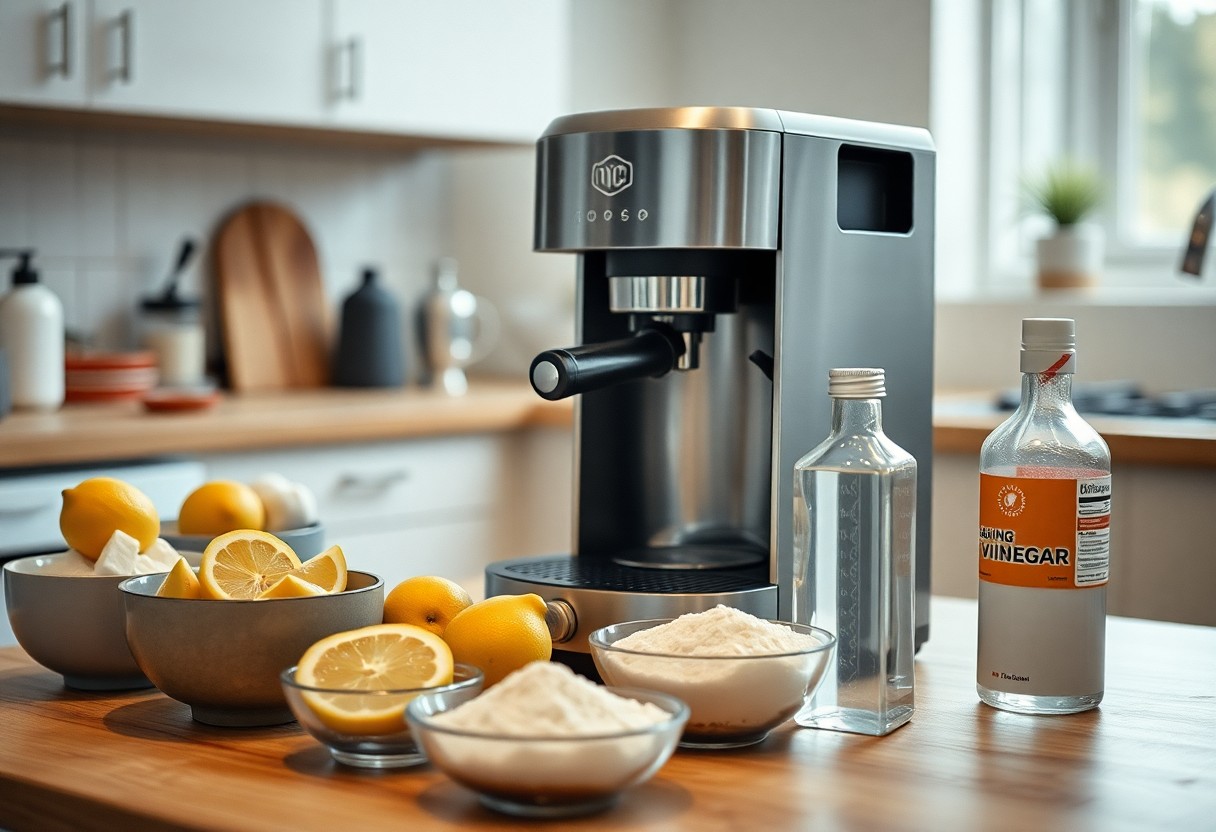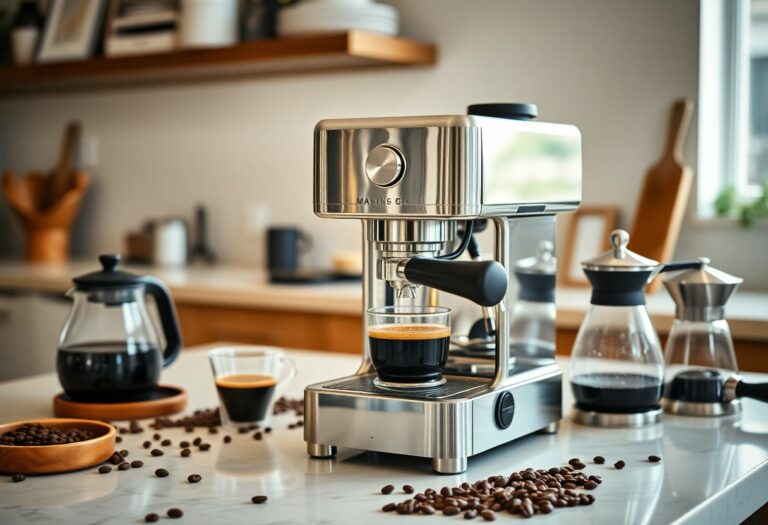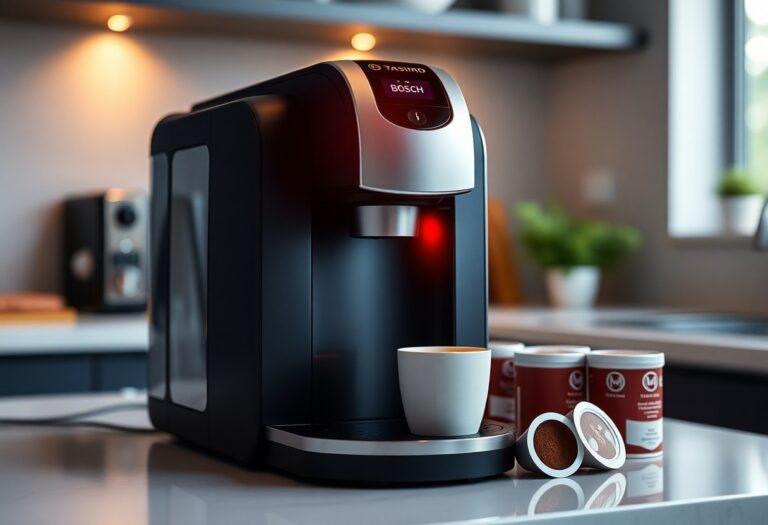What Can Be Used to Descale a Coffee Machine – Descaling Agents
Most coffee enthusiasts know that descaling your coffee machine is vital for maintaining its performance and longevity. To effectively remove mineral buildup, you can use commercial descaling agents designed specifically for this purpose, which are effective and safe for your appliance. Alternatively, common household items like white vinegar or citric acid can also serve as natural descalers. However, be cautious, as certain acids can be harmful to your machine if used improperly. In this post, you will learn about different options available to keep your coffee maker in top condition.
Key Takeaways:
- Common descaling agents include white vinegar, citric acid, and commercial descaling solutions specifically designed for coffee machines.
- White vinegar is an affordable and natural option but has a strong odor that may linger after descaling.
- Citric acid is another effective option, often preferred for its less intense smell and ability to combat mineral buildup efficiently.
- Commercial descaling solutions may offer convenience and efficiency, often formulated to be safe for specific coffee machine brands.
- It’s important to follow the manufacturer’s instructions for descaling frequency and the type of agent used to avoid damaging the machine.
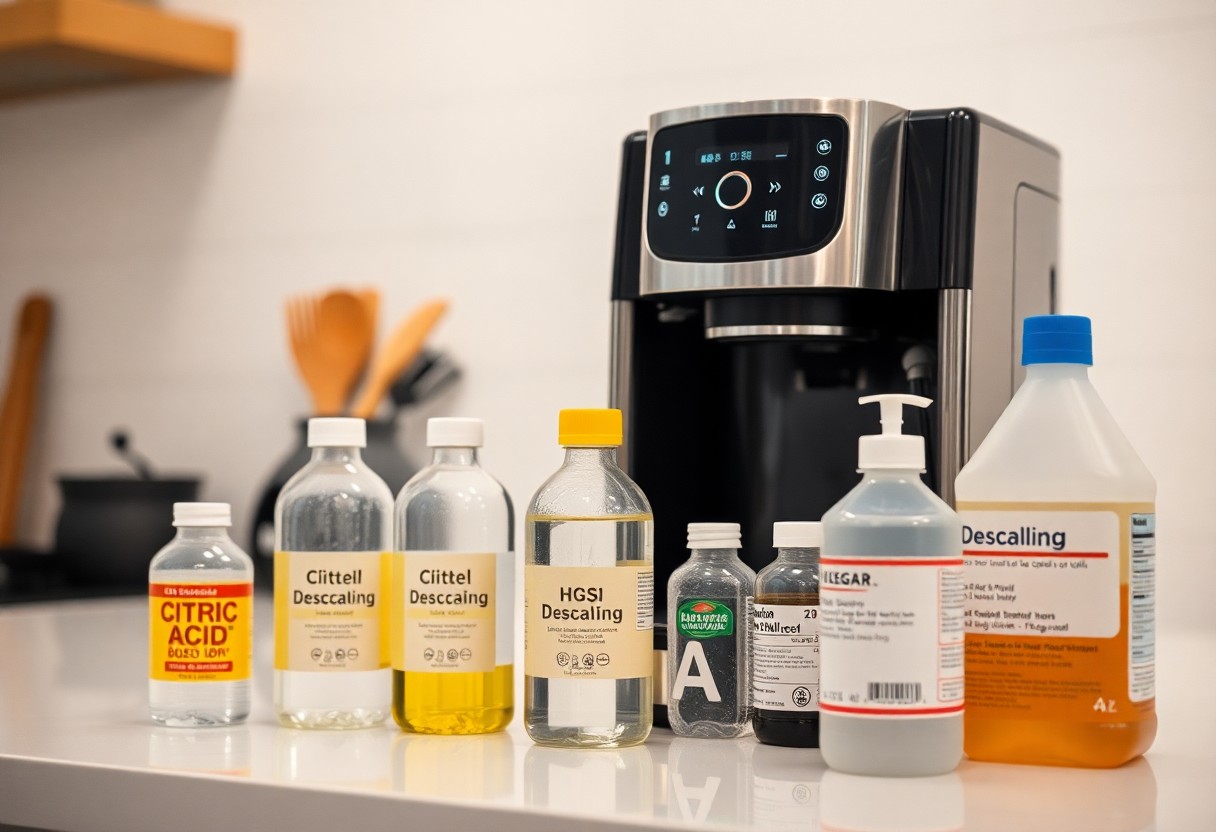
The Science and Importance of Descaling
Descaling a coffee machine involves removing limescale buildup, which is primarily composed of calcium carbonate, that accumulates from hard water. As water is heated during the brewing process, minerals precipitate and form this scale, which can significantly impact your machine’s functionality. Regular descaling is important to maintain optimal water flow, prevent overheating, and ensure the longevity of your coffee equipment. Not only does this upkeep improve machine performance, but it also enhances the flavor profile of your coffee by promoting better extraction of coffee oils and compounds.
How Limescale Affects Coffee Quality
Limescale interferes with the heating elements and water channels of your coffee machine, leading to uneven temperature management. This inconsistency negatively influences how coffee is brewed, often resulting in a bitter or off-taste in your final cup. The presence of limescale means that ideal brewing temperatures cannot be reached, impacting extraction and ultimately the quality of the coffee. Regular descaling ensures you enjoy a fresher, more flavorful brew.
The Role of Regular Maintenance in Equipment Longevity
Regular maintenance, which includes descaling, plays a significant role in extending the lifespan of your coffee machine. By proactively addressing limescale accumulation, you prevent potential damage to internal components, such as pumps and boilers, that can lead to costly repairs or replacement. Machines that are consistently maintained can last for over a decade, providing you a dependable partner in brewing high-quality coffee. Consider scheduling descaling every 1-3 months depending on your water hardness and usage frequency for optimal performance.
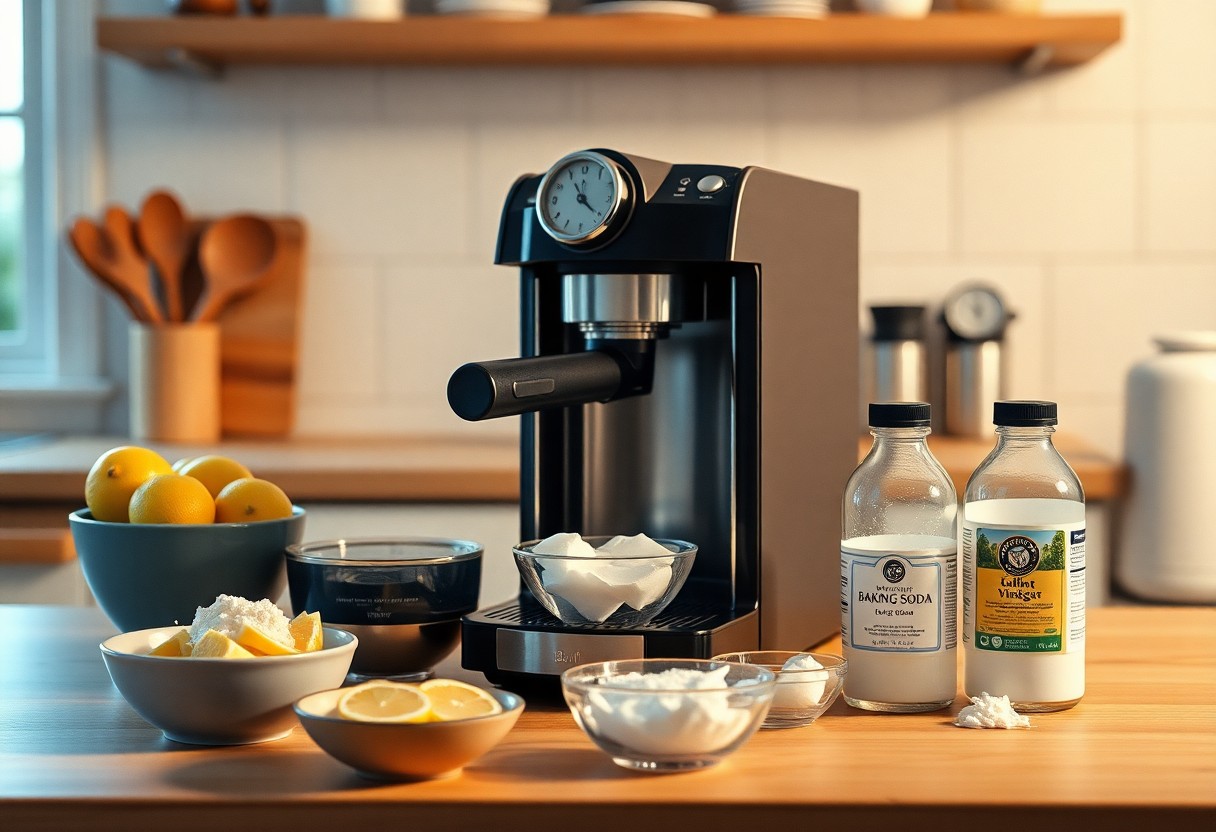
Natural Descaling Agents: A Green Approach
Natural descaling agents provide an eco-friendly alternative to chemical solutions, offering effective cleaning without harsh additives. Utilizing common household items, these agents not only serve to descale your coffee machine but also promote sustainability. They are easy to use and typically safer for both your machine and the environment, allowing you to maintain your coffee equipment while keeping your conscience clear.
Vinegar: The Favorite Yet Controversial Solution
White vinegar is perhaps the most well-known natural descaling agent, lauded for its acidic properties that effectively combat limescale buildup. While it can remove that stubborn mineral residue, some coffee enthusiasts debate its impact on flavor, fearing an aftertaste in brewed coffee. If you choose vinegar, it’s wise to thoroughly rinse your machine afterward to avoid any lingering vinegar scent.
Citric Acid: Nature’s Effective Cleaner
Citric acid stands out as a powerful natural descaling agent, derived from citrus fruits like lemons and limes. Its effectiveness lies in its ability to dissolve mineral deposits without compromising the flavor of your coffee. Many coffee aficionados recommend a solution of one to two tablespoons of citric acid mixed with water, making it a safe and helpful tool for regular maintenance.
Using citric acid not only cleans effectively but also helps to prevent limescale from forming in the first place. This organic compound breaks down calcium and magnesium deposits efficiently, minimizing maintenance efforts in the long run. Best of all, citric acid is non-toxic, making it a safe choice for households with children or pets. You can find citric acid in powdered form at grocery stores or pharmacies, ensuring you have a readily available solution for keeping your coffee machine in top shape.
Commercial Descalers: The Power of Formulations
Commercial descalers harness advanced formulations to tackle limescale with precision. These products often contain specialized ingredients that quickly dissolve mineral buildup, restoring your coffee machine’s performance. With a variety of options available, you can find descalers tailored for specific brands or general use, ensuring you achieve optimal results effortlessly. Many manufacturers recommend these solutions for regular maintenance, highlighting their efficacy in prolonging your machine’s lifespan while ensuring that your coffee tastes its best.
Ingredients to Look for in Store-Bought Descalers
When shopping for commercial descalers, aim for products that include ingredients like citric acid, lactic acid, or tartaric acid. These compounds effectively break down limescale and are often less harsh on your machine compared to harsher chemicals. Additionally, check for biodegradable certifications if you’re concerned about environmental impact. Opting for products with minimal artificial additives can also ensure you’re using a solution that won’t compromise the quality of your coffee.
Pros and Cons of Using Commercial Products
| Pros | Cons |
|---|---|
| Quick and effective results | Can be expensive |
| Designed specifically for machines | May contain harsh chemicals |
| Minimal effort required | Not eco-friendly if chemicals present |
| Regular maintenance recommended | Limited compatibility with all machines |
| Guidelines from manufacturers | Potential for over-reliance |
Using commercial descalers offers a blend of advantages and disadvantages. You benefit from the speed and efficiency of these products, which can save you time and effort in maintaining your coffee machine. Nevertheless, consider the costs and possible environmental implications, particularly if the product contains harsh chemicals. Regular use aligned with manufacturer guidelines can help keep your machine in top shape, but relying solely on these solutions may overlook the value of natural alternatives or DIY methods.
Practical Steps for Effective Descaling
Descaling your coffee machine effectively requires precision and attention to detail. Begin by gathering your chosen descaling agent, water, and a large container for the cleaning solution. Make sure to unplug the machine and empty the water reservoir before starting the process. Follow the instructions on your descaling agent closely, mixing it with water as recommended, and run a descaling cycle if your machine has one. Always finish by flushing out the system with clean water to eliminate any residual solution.
DIY Descaling Methods: Precise Instructions
Create a homemade descaling solution with equal parts of distilled white vinegar and water. Pour the mixture into the water reservoir and run a brewing cycle, allowing the solution to flow through the machine. Afterward, run two to three cycles with just water to ensure any vinegar taste is completely rinsed out. This method is not only cost-effective but also eco-friendly, as it avoids harsh chemicals.
Frequency and Best Practices in Maintenance
Descaling should ideally occur every one to three months, depending on the hardness of your water and how often you use your machine. Regular maintenance prevents scale buildup, ensuring your coffee tastes fresh and your machine operates efficiently. It’s also wise to clean your coffee maker’s other components, like the filter and brew basket, to maintain overall hygiene and performance.
Establishing a regular descaling schedule enhances your coffee machine’s longevity and ensures optimal flavor extraction. For hard water areas, opt for monthly descaling; for those using filtered water, every three months suffices. Pay attention to your machine’s indicator light, if equipped, and incorporate routine cleaning of non-descaling parts like the drip tray and water reservoir to maintain peak performance. Consider keeping a maintenance log to track your descaling sessions, making it easier to stay on top of this crucial upkeep.
Beyond Descaling: Comprehensive Machine Care
A coffee machine needs more than just descaling to function at its best. Regular maintenance routines can significantly extend its lifespan and improve brew quality. Incorporating thorough cleanings, such as wiping down the exterior and cleaning the brew basket, ensures that your machine remains in prime condition. For an in-depth guide, check out How To Clean And Descale A Coffee Maker.
Additional Cleaning Tips for Optimal Performance
Adding extra care to your routine can enhance your coffee experience. Pay attention to these key practices:
- Regularly clean your coffee pot and water reservoir to prevent residue buildup.
- Change the water filter, if applicable, to maintain water quality for brewing.
- Inspect and clean any removable parts, ensuring they are free of oil or coffee grounds.
- Keep the exterior of the machine clean to avoid grime and dirt accumulation.
Any inconsistencies in brewing may signal it’s time to refresh your cleaning routine.
When to Seek Professional Help
Your coffee machine may require expert attention if issues persist after standard cleaning and descaling techniques. Signs such as frequent brewing malfunctions, strange noises, or prolonged brewing times may indicate deeper mechanical problems. If these symptoms occur, engaging a professional technician can prevent further damage and ensure your machine operates efficiently.
Regular maintenance combined with professional assessments can greatly enhance your coffee machine’s performance. When issues arise that routine care cannot resolve, trained technicians can troubleshoot problems, repair crucial components, and provide tailored advice, leading to a smoother, more enjoyable brewing experience.
Summing Up
From above, you can see that various descaling agents like citric acid, vinegar, and commercial descalers are effective in maintaining your coffee machine’s performance. Each option has its benefits, so you can choose based on convenience and availability. For tailored recommendations, check out We Set Out to Find the Best Coffee-Maker Cleaner. Regular descaling will not only enhance the taste of your coffee but also extend the life of your machine.
FAQ
Q: What are common descaling agents for coffee machines?
A: Common descaling agents for coffee machines include citric acid, vinegar, commercial descaling solutions, and baking soda. Citric acid is a natural and effective option, while vinegar is an economical choice. Commercial descalers are specifically formulated for appliances and can be very effective. Baking soda, while primarily used for freshening, can assist with light descaling when mixed with water.
Q: Can I use vinegar to descale my coffee machine?
A: Yes, vinegar can be used to descale coffee machines. It is an inexpensive and environmentally friendly option. To use vinegar, mix equal parts of water and white vinegar, then run the solution through the coffee machine to remove mineral buildup. Afterward, flush the machine with plain water to eliminate any vinegar residue and taste.
Q: How often should I descale my coffee machine?
A: The frequency of descaling can vary based on usage and water hardness. Generally, it is recommended to descale your coffee machine every 3 to 6 months. If you notice slow brewing times or unusual tastes, it may indicate that descaling is needed sooner.
Q: Are there commercial descalers specifically for coffee machines?
A: Yes, there are many commercial descalers available that are specifically designed for coffee machines. These products typically contain ingredients that effectively break down mineral deposits without damaging the machine. Always follow the manufacturer’s instructions for the best results when using these descalers.
Q: Is it safe to use baking soda as a descaling agent?
A: Baking soda can be used for light descaling but is not as effective as other options for tougher mineral deposits. It is a gentle option that may help neutralize odors in addition to removing some scaling. For more effective descaling, a stronger agent like citric acid or a commercial descaler is suggested. Always check your manufacturer’s guidelines before using baking soda as a descaling agent.

